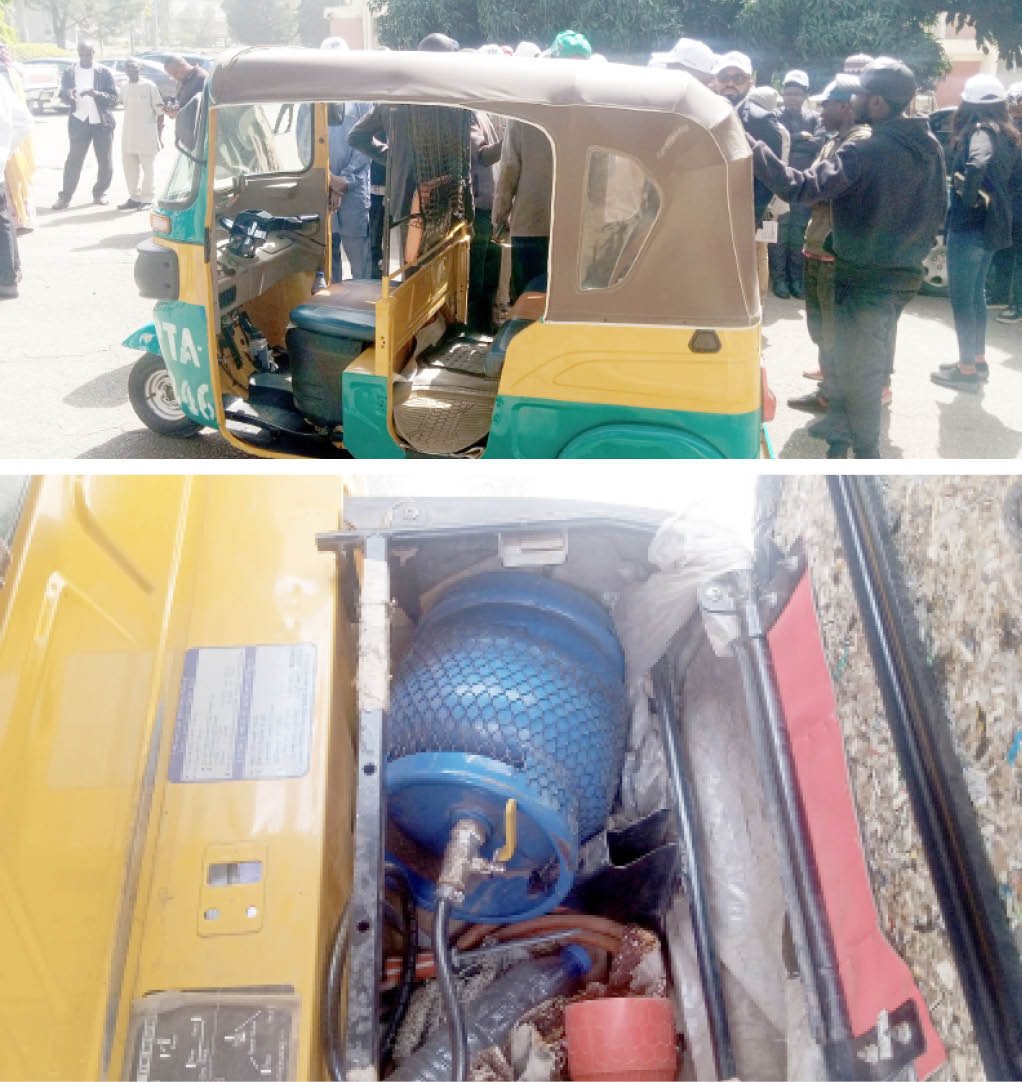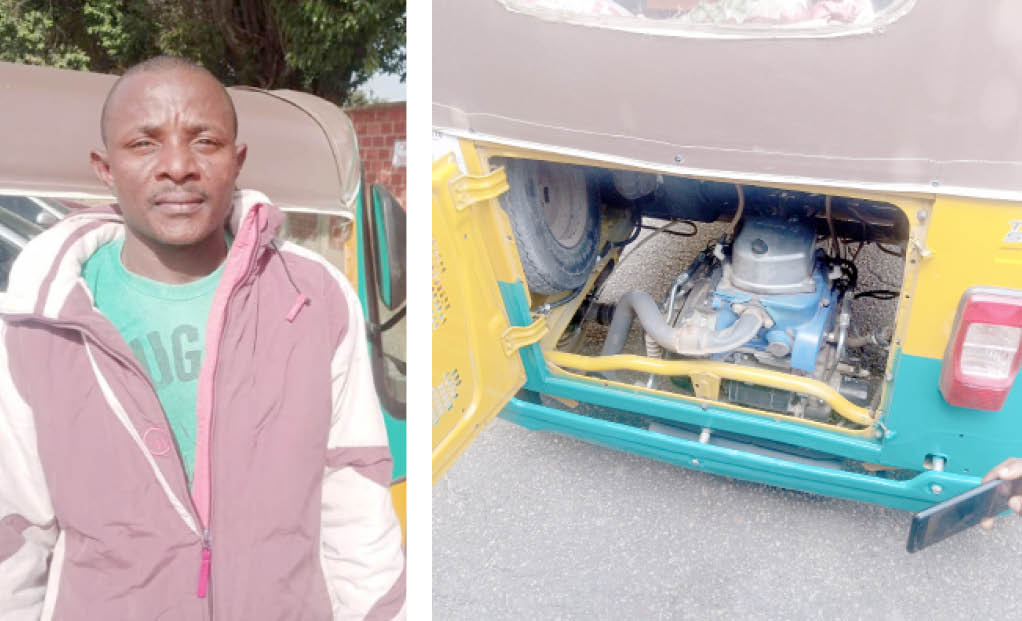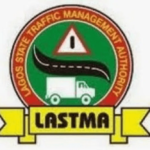Plying the streets of Jos, the Plateau State capital in his tricycle, picking passengers from one point to another and charging the same fares, Abdulkareem Mahmood operates like any other intra-city transporter.
Daily Trust Saturday reports that the difference between Mahmood and other tricyclists in Jos is that he now patronises gas instead of petrol stations. While some of his passengers get amazed, others become uneasy. He operates a tricycle powered mostly by gas but also consumes fuel.
This gas-powered tricycle initiative followed the removal of fuel subsidy and its attendant astronomical increase in the price of the commodity.
This initiative by A. A. Multi Links came into Jos in October 2023 but many tricycle operators were skeptical of converting their vehicles from using fuel to gas (alternatively). But Mahmood made the bold decision and converted his vehicle.
Joshua to face Ngannou in Saudi on March 8
Insecurity: Don’t Shift Blame to Councilmen, Do Your Job, Adeyanju Tells Wike
Since then, whenever he goes to the gas station to refill, his passengers often ask questions as they would want to know how it is better than fuel.
Sharing his experience so far with our correspondent, Mahmood said gas was cheaper than fuel in powering his tricycle. He said the tricycle was constructed in a manner that it could alternate between gas and fuel.
The tricycle rider, who resides in the Dogon Karfe area of Jos South Local Government Area, said that since he started using his 3kg gas to power his vehicle, there has not been any hitch. According to him, it is safe, convenient, accessible and cheaper.
“I can use fuel, as well as gas. Whenever I use fuel I spend between N5,500 and N6,000 daily and make between N9,000 and N10,000, but whenever I use gas, I fill the cylinder, which is 3kg with N1,100; in some places it is N1,150.

“At the initial stage when the tricycle was reconstructed for me by the company in October, gas was N950, but now, it is N1,100 in some places and N1,150 in other places.
“Nonetheless, I still make more gain than when I use fuel. I make between N7,000 to N8,000 gain daily whenever I use gas, and that is a difference of N3,000 and above compared to when I use fuel. My operation time is between 8am and 5pm to 6pm daily.
“It is also worth mentioning that before I reconstructed the tricycle, I asked the company, A. A. Multi Links, about any attendant danger from using gas to power it and they gave me the assurance that is danger-free.
“Their assurance, coupled with the fact that I have also seen a video of tricycles operating with gas shortly before the company came to Jos, I was emboldened to negotiate with them to reconstruct mine. And since I have been using the tricycle, I have neither encountered any problem nor anything associated with gas danger.
“People who know or see me using gas to power the tricycle often marvel; some come to me to ask plenty questions. The latest of such was few days ago when I went to Katako junction and people numbering 15 crowded me and were throwing different questions at me about the tricycle. I was exhausted trying to answer their questions,” he said.
Mahmood called on tricycle operators to approach the company to convert their vehicles to alternate between gas and fuel because of its benefits.
He pointed out that currently, about 10 tricyclists have indicated interest and have either converted their tricycles to using gas or in the process of doing so.
Speaking on the initiative of tricycles using alternative sources of power than fuel, the chairman of Giopat Consulting Firm, Michael Magaji, said it was very good.
He said the initiative would immensely benefit tricycle operators.
Magaji added that he hoped the initiative would force down the cost of transportation in Jos and the state in general.
He said they were working with their financial partners and banks to facilitate the conversion of tricycle engines from petrol to gas/electricity and make its operation easier.
Some tricycle users who spoke with our correspondent said the innovation was very good as long as it is safe.
A resident of the Abattoir area of Jos, Musa Dauda, said he had no problem entering such tricycle, saying there is no fear of possible explosion as long as the rider is careful and abides by all the instructions given by the company that did the conversion.
He called on operators to embrace the innovation and reduce cost of transportation.
A resident of Anglo Jos, Jemimah Serki, said her major concern was not what they use in powering the tricycles but the attitude of operators and passengers, such as rough riding, theft, among other things.
She called on the Plateau State Government to redouble its efforts at checking the criminal activities of tricycle riders and some passengers.
Meanwhile, in an effort to check the criminal activities associated with tricycle operation in Plateau State, the state government recently ordered all the operators in the state to be enumerated registered.
The government also asked those without a National Identification Number (NIN) to quit the roads because that is where the correct data of every operator and others can be gotten.
Speaking at an official flag-off of the Integrated Tricycle Transport Management System (ITTMS) project by the Ministry of Transportation, the Commissioner for Transport in the state, Jatau Davou Gyang, said the advantages of the enumeration were enormous.
Gyang said that through this policy, kidnapping, theft and other criminal activities would be stopped and operation time for tricycle riders in the state could be extended beyond the stipulated 7pm.
“We are aware of the infractions and troubles the state has gone through as a result of the activities of criminal tricycle riders without clear identities. So we have decided to identify clearly who owns and rides tricycles on the Plateau, especially in line with Jos master plan.
“The essence is very simple. Government has the duty of securing the lives and property of residents. And Governor Caleb Mutfwang holds the life of every Plateau resident dear to heart.
“We want to say goodbye to those days of unsuspecting Plateau people being maimed trying to get to their destinations using tricycles. And the only way to do that is to know who the tricycle riders are.
“People always hold government accountable for anything that happens in the state, with respect to government’s actions or inactions. But in this case, government would want to hold someone accountable for his actions; that is to know who to hold responsible when certain things happen.
“So, if you are a user of tricycle on the Plateau, submit yourself for enumeration and data capturing. On this note, those tricycle riders without the National Identification Number have no business on our roads because that is where you get the correct data of every Nigerian citizen. And we want to synchronise and align such data with every tricycle rider,” he said.
He, however, commended the innovation of converting tricycles from using only fuel to alternative sources, saying it would tremendously boost the transportation system in the state.

 Join Daily Trust WhatsApp Community For Quick Access To News and Happenings Around You.
Join Daily Trust WhatsApp Community For Quick Access To News and Happenings Around You.


